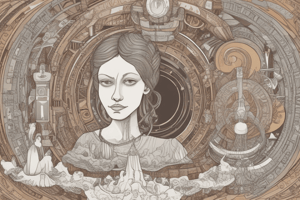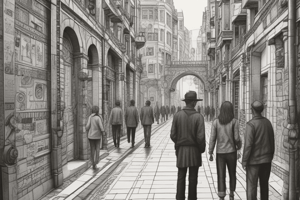Podcast
Questions and Answers
What is the primary function of norms and social codes in a culture?
What is the primary function of norms and social codes in a culture?
What is the primary focus of the 20th century definition of culture, as stated by Levi-Strauss?
What is the primary focus of the 20th century definition of culture, as stated by Levi-Strauss?
What is the relationship between values and norms?
What is the relationship between values and norms?
What is the main argument made by sociologists regarding cultural factors and meanings?
What is the main argument made by sociologists regarding cultural factors and meanings?
Signup and view all the answers
What distinguishes laws from norms and social codes?
What distinguishes laws from norms and social codes?
Signup and view all the answers
What is the main difference between symbolic codes and norms and social codes?
What is the main difference between symbolic codes and norms and social codes?
Signup and view all the answers
What is the result of the intense postmodern mediation in the globalized world?
What is the result of the intense postmodern mediation in the globalized world?
Signup and view all the answers
What is the relationship between attitude and behaviour?
What is the relationship between attitude and behaviour?
Signup and view all the answers
What is the primary function of cultural practices, according to the social and cultural construction of meaning?
What is the primary function of cultural practices, according to the social and cultural construction of meaning?
Signup and view all the answers
What is a primary function of culture in regards to social groups?
What is a primary function of culture in regards to social groups?
Signup and view all the answers
What is the primary focus of classical works on cultural change in the U.S.?
What is the primary focus of classical works on cultural change in the U.S.?
Signup and view all the answers
What is the significance of beauty standards and fashion in the context of cultural factors?
What is the significance of beauty standards and fashion in the context of cultural factors?
Signup and view all the answers
What is the primary characteristic of the cultural turn in sociology?
What is the primary characteristic of the cultural turn in sociology?
Signup and view all the answers
What is the primary role of symbols in human social life, according to Clifford Geertz?
What is the primary role of symbols in human social life, according to Clifford Geertz?
Signup and view all the answers
How do cultural explanations of social phenomena differ from institutional approaches?
How do cultural explanations of social phenomena differ from institutional approaches?
Signup and view all the answers
What is the main way in which culture influences our thoughts and behaviors, according to the text?
What is the main way in which culture influences our thoughts and behaviors, according to the text?
Signup and view all the answers
What is the significance of learning how to interact with outsiders in the contemporary world?
What is the significance of learning how to interact with outsiders in the contemporary world?
Signup and view all the answers
What is the primary focus of thinking sociologically about culture?
What is the primary focus of thinking sociologically about culture?
Signup and view all the answers
Norms and social codes are abstract by definition.
Norms and social codes are abstract by definition.
Signup and view all the answers
Values are less generalized than norms.
Values are less generalized than norms.
Signup and view all the answers
Laws are a type of informal sanction.
Laws are a type of informal sanction.
Signup and view all the answers
Behaviour is the same as attitude.
Behaviour is the same as attitude.
Signup and view all the answers
Thinking sociologically about culture involves examining the rules and conventions that govern human behaviour.
Thinking sociologically about culture involves examining the rules and conventions that govern human behaviour.
Signup and view all the answers
Cultural practices are primarily focused on cultural change in the U.S.
Cultural practices are primarily focused on cultural change in the U.S.
Signup and view all the answers
Culture always distinguishes between insiders and outsiders using explicit and visible signs.
Culture always distinguishes between insiders and outsiders using explicit and visible signs.
Signup and view all the answers
Symbolic systems are limited to material objects and external events.
Symbolic systems are limited to material objects and external events.
Signup and view all the answers
Institutional approaches consider meaning to be a reflection of external material conditions and resources only.
Institutional approaches consider meaning to be a reflection of external material conditions and resources only.
Signup and view all the answers
Thinking sociologically about culture means focusing on how culture shapes our behavior and attitudes.
Thinking sociologically about culture means focusing on how culture shapes our behavior and attitudes.
Signup and view all the answers
Cultural explanations of social phenomena are limited to individual perspectives and personal experiences.
Cultural explanations of social phenomena are limited to individual perspectives and personal experiences.
Signup and view all the answers
Learning to interact with outsiders is a trivial aspect of socialization in the contemporary world.
Learning to interact with outsiders is a trivial aspect of socialization in the contemporary world.
Signup and view all the answers
Culture can be defined as the cultivation of the land, crops, and animals.
Culture can be defined as the cultivation of the land, crops, and animals.
Signup and view all the answers
High culture and popular culture are terms used to describe the same type of culture.
High culture and popular culture are terms used to describe the same type of culture.
Signup and view all the answers
The cultural turn in sociology focuses on institutional explanations of social phenomena.
The cultural turn in sociology focuses on institutional explanations of social phenomena.
Signup and view all the answers
Meaning is constructed through social interaction and shared cultural symbols.
Meaning is constructed through social interaction and shared cultural symbols.
Signup and view all the answers
The 18th century Enlightenment viewed culture as a universal process.
The 18th century Enlightenment viewed culture as a universal process.
Signup and view all the answers
In sociology, culture is solely defined as the arts and civilization.
In sociology, culture is solely defined as the arts and civilization.
Signup and view all the answers
How do norms and social codes differ from symbolic systems in terms of their abstractness and application?
How do norms and social codes differ from symbolic systems in terms of their abstractness and application?
Signup and view all the answers
What role do values play in shaping norms and social codes in a culture?
What role do values play in shaping norms and social codes in a culture?
Signup and view all the answers
How do laws differ from norms and social codes in terms of their implementation and enforcement?
How do laws differ from norms and social codes in terms of their implementation and enforcement?
Signup and view all the answers
What is the relationship between attitude and behavior, according to sociological thinking?
What is the relationship between attitude and behavior, according to sociological thinking?
Signup and view all the answers
How do cultural explanations of social phenomena differ from institutional approaches?
How do cultural explanations of social phenomena differ from institutional approaches?
Signup and view all the answers
What is the primary focus of thinking sociologically about culture, according to the text?
What is the primary focus of thinking sociologically about culture, according to the text?
Signup and view all the answers
What is the primary role of symbols in human social life, according to Clifford Geertz?
What is the primary role of symbols in human social life, according to Clifford Geertz?
Signup and view all the answers
How do cultural explanations of social phenomena differ from institutional approaches?
How do cultural explanations of social phenomena differ from institutional approaches?
Signup and view all the answers
What is the significance of learning how to interact with outsiders in the contemporary world?
What is the significance of learning how to interact with outsiders in the contemporary world?
Signup and view all the answers
What is the primary focus of thinking sociologically about culture?
What is the primary focus of thinking sociologically about culture?
Signup and view all the answers
What is the primary function of culture in regards to social groups?
What is the primary function of culture in regards to social groups?
Signup and view all the answers
What is the central argument of critiques of institutional approaches to meaning construction?
What is the central argument of critiques of institutional approaches to meaning construction?
Signup and view all the answers
How does the social and cultural construction of meaning approach the concept of culture?
How does the social and cultural construction of meaning approach the concept of culture?
Signup and view all the answers
What is the significance of the cultural turn in sociology?
What is the significance of the cultural turn in sociology?
Signup and view all the answers
How do cultural explanations of social phenomena differ from institutional approaches?
How do cultural explanations of social phenomena differ from institutional approaches?
Signup and view all the answers
What is the primary characteristic of the cultural turn in sociology?
What is the primary characteristic of the cultural turn in sociology?
Signup and view all the answers
How do sociologists approach the concept of meaning in relation to culture?
How do sociologists approach the concept of meaning in relation to culture?
Signup and view all the answers
What is the significance of thinking sociologically about culture?
What is the significance of thinking sociologically about culture?
Signup and view all the answers
Study Notes
The Social and Cultural Construction of Meaning
- Culture shares not only symbolic systems of meaning but also norms and social codes that regulate and control behavior in precise ways.
- Norms and social codes are tied to concrete situations, unlike symbolic codes, which are abstract.
Norms and Social Codes
- Norms and social codes are followed to avoid formal or informal sanctions.
- Following norms allows us to go about our daily lives without having to rethink every move.
- Values are more generalized than norms, providing frameworks for ideals and anti-ideals within which norms make sense.
Laws
- Laws are written norms that prescribe or proscribe specific sets of behaviors under threat of punishment.
- Behavior is everything we do, and our behaviors may be consistent or inconsistent with our attitudes.
- Attitude is the statements people make about their values and beliefs.
The Cultural Turn in Sociology
- Culture is the symbolic and learned aspects of human society transmitted and shared via social interaction.
- The cultural turn in sociology emphasizes the importance of symbols in producing meaning.
- Every social practice has a symbolic dimension, and culture is this dimension of symbolization and meaning.
Classical Works on Cultural Change
- Classical works on cultural change in the U.S. focus on what culture is as a ‘thing’ (the arts) or a ‘state of being’ (civilization).
- Examples of cultural factors include beauty standards and fashion, which exist within narrow social, historical, and cultural parameters.
Post-Modernity and Globalization
- Post-modernity and globalization lead to increased mediation of our relations with each other and with nature through symbolic mechanisms.
- Our knowledge is obtained not through direct, personal experiences but through the media and their pundits.
- Globalization increases interconnections, bringing the world into our living room.
Cultural Explanations of Social Phenomena
- A central function of culture is to distinguish between “insiders” and “outsiders”.
- Humans are social by nature and distinguish their groups from others by using cultural elements.
- Learning how to interact with outsiders is a crucial feature of socialization in the contemporary world.
Critiques of Institutional Approaches
- Meaning is not simply a reflection of external, material conditions and resources.
- External factors interact with internal structures of meaning.
Thinking Sociologically about Culture
- Human social life is to a large degree symbolic.
- Symbols are objects, acts, events, qualities, or relations that serve as vehicles for a conception.
- Culture exerts an “invisible” and “implicit” power over us, and we often live under the impression that specific ideas, feelings, and tastes are simply personal.
Studying That Suits You
Use AI to generate personalized quizzes and flashcards to suit your learning preferences.
Related Documents
Description
Explore how culture shapes our perceptions and influences our behavior, often without us realizing it. This quiz delves into the social and cultural construction of meaning, and how cultural explanations shape our understanding of social phenomena.




